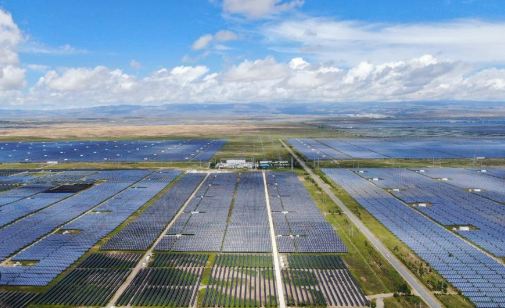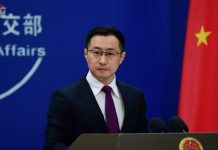By Zhong Sheng, People’s Daily
Developed countries must face up to their responsibilities to address climate change. “If we persist in delaying key measures that are needed, I think we are moving into a catastrophic situation,” United Nations (UN) Secretary-General Antonio Guterres warned after many parts of the globe were recently hit by extreme weathers.
However, developed countries have long ignored their responsibilities and failed to deliver on their promises, which undermined the current climate agenda. They have triggered dissatisfaction from the international community, especially the developing world.
Developed countries have historical responsibilities, legal obligations and moral responsibilities for climate change, making developing countries the biggest victims.
According to a recent study led by the University of Leeds and published in the UK journal Nature Sustainability, almost 90 percent of excess carbon emissions come from developed countries, including the United States.
However, developed countries are just making empty rhetoric and shifting the responsibility to the developing world. This is totally against the principle of “common but differentiated responsibilities” in the UN Framework Convention on Climate Change and the Paris Agreement.
Brazilian President Luiz Inacio Lula da Silva recently said that who polluted the planet in these last 200 years were those who made the Industrial Revolution, and for this, they have to pay the historic debt they have with planet Earth.
Developing countries have not seen enough sincerity from developed countries in coping with climate change. Climate finance remains a key to the global challenge.
The UN Framework Convention on Climate Change and the Paris Agreement have made clear the responsibilities and obligations of developed countries to provide financial resources, while developing countries are encouraged to provide such support voluntarily.
The University of Leeds report indicated that developed countries could be liable to pay $170 trillion in climate reparations to low-emitting countries to ensure targets to curtail climate breakdown are met.
Guterres noted that adaptation needs in the developing world are set to skyrocket to as much as $340 billion a year by 2030. However, facing such a financing gap, developed countries have yet to deliver on their promise of mobilizing $100 billion per year for climate action in developing countries before 2020—a promise made 14 years ago, and to offer a roadmap for doubling adaptation finance.
Climate finance was a focus of the recent Summit for a New Global Financing Pact held in Paris. Sultan Ahmed Al Jaber, president-designate of the 28th session of the Conference of the Parties to the UN Framework Convention on Climate Change, noted that there is a huge financing gap in coping with climate change and promoting sustainable development of the world, and the climate finance promise is “barely band-aids, or painkillers, to a problem that requires major surgery.”
Over recent years, some developed counties have backpedaled their climate policies. Their fossil energy consumption and carbon emission, instead of decreasing, went up, affecting the global climate governance process.
The U.S. government has repeatedly stressed the importance of transparency, responsibility, and respect for international rules, but it has lacked continuous, consistent, transparent and responsible climate policies. It has failed to ratify the Kyoto Protocol and once withdrew from the Paris Agreement, becoming a saboteur of global climate governance.
Besides, the United States, under the disguise of promoting energy transition, invested hundreds of billions of U.S. dollars in subsidizing its domestic manufacturers via various unfair acts and administrative measures. It also built trade barriers against the green industries of developing countries by cutting their access to green technologies.
These acts blatantly violated the basic rules of the WTO, disturbed the industrial and supply chains of the global green industry, undermined the efforts of other countries to achieve sustainable development goals and went against the joint efforts of the international community to cope with climate change.
China has all along made efforts to promote ecological civilization and taken concrete actions on climate governance.
The country has announced its targets of carbon peaking and carbon neutrality, under which it will make the biggest reduction in carbon emission intensity in the world and move from carbon peaking to carbon neutrality in the shortest time span in world history.
It has worked steadily to adjust the energy mix. Today, China has the world’s largest installed capacity and power generation from wind and solar power, and leads the world in the output and sales of new energy vehicles.
A recent Bloomberg report pointed out that China is emerging as a leader on the most important predictor of the climate future – the speed with which clean energy is being deployed to replace fossil fuels.
Apart from following a green development path itself, China continues to deepen South-South cooperation on tackling climate change. It is doing its best to offer support and assistance for other developing countries to cope with climate change under the frameworks of the Belt and Road Initiative and South-South cooperation.
Tackling climate change is a mission facing all mankind. The international community should work together to build an equitable and effective global mechanism on climate change.
For climate change, a take-more-give-less approach based on a utilitarian mindset is in nobody’s interest. The developed world should face up to its historical responsibilities, deliver on its promise as soon as possible, expand its support for developing countries in terms of finance, technology and capacity building, and work with developing countries to achieve concrete progress in global climate governance.
(Zhong Sheng is a pen name often used by People’s Daily to express its views on foreign policy and international affairs.)












